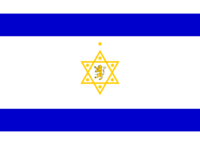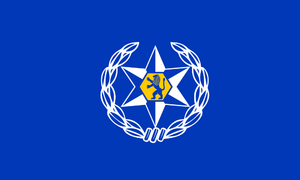Royal Yisraeli Defense Forces
This article is incomplete because it is pending further input from participants, or it is a work-in-progress by one author. Please comment on this article's talk page to share your input, comments and questions. Note: To contribute to this article, you may need to seek help from the author(s) of this page. |
| Royal Yisraeli Defense Forces | |
|---|---|
| כוחות הביטחון רויאל הישראלי | |
 Flag of the Kingdom. | |
| Founded | 1715 (as Royal Armed Forces) |
| Current form | 1952 |
| Service branches | Army, Navy, Air Force, Border Guard |
| Headquarters | Defense Ministry headquarters, Dervaylik |
| Leadership | |
| Commander-in-chief | Hezekiah III (head of state) |
| Defense Minister | Naftali Bauman |
| Chief of General Staff | Azriel Bruzansky |
| Manpower | |
| Military age | 17–49 years old |
| Conscription | Yes |
| Reaching military age annually | (2020 est.) |
| Active personnel | 376,906 |
| Reserve personnel | 905,222 |
| Expenditures | |
| Budget | $69.97 billion |
| Percent of GDP | 5.5% |
The Royal Yisraeli Defense Forces are the unified military force of the Kingdom of Yisrael. The military organization consists of four armed services (in order of precedence): the Army, the Navy, the Air Force, and the Border Guard. The royal military is headquartered in the Defense Ministry headquarters, located in Dervaylik. The royal armed forces were formed 1715 after Yisrael's proclamation of the kingdom from the Grand Duchy during the First West Scipian War (1713-1715).
The military is overseen by civilian oversight with a provision for emergency military rule by the invocation of Order 14 by either His Majesty the King or the President in the 1920 Constitution. Until the Royal Reform Acts in 1952, the King was the formal commander-in-chief; after this, the President was declared Supreme Commander and made de facto formal commander-in-chief on a daily basis. However, this mandate was revoked in the Hezekian Reaction in January 2020. The President is responsible for appointing the leadership of the Defense Ministry, an executive royal department that is the primary organization by which military policy is carried out. It is headed by the Defense Minister, a civilian member of Cabinet who nevertheless is by tradition a former high-ranking military officer, who serves as second-in-command of the Yisraeli military. The Chief of the General Staff is third-in-line to command over the Defense Forces. Naftali Bauman is the incumbent Defense Minister spanning the Feldman-Katz eras and is the longest-serving minister in office as of January 2021.
The General Staff is an advisory organization that coordinates with flag officers from all four service branches in the armed forces.
The Royal forces were the direct successors of the Grand Ducal Army. After the Proclamation of the Kingdom of Yisrael, these forces were reorganized and professionalized into a proper standing army known as the Royal Armed Forces. After the Royal Reform Acts of 1952, the military was renamed to its current title.
With the evolution of military strategy, tactics, and technology in the late 19th century and early 20th century, the armed forces underwent significant changes in structure, organization, weaponry, and leadership. With the emergence of the Year of Blood (1950-1951), the Royal military has been reorganized into its present form to be a powerful and highly effective fighting force. This was altered slightly in the 2010s with the dedication of an independent expeditionary Marine division and a revamped focus to rapid-reaction expeditionary capabilities, with a shift in Yisraeli foreign policy aims beyond its near abroad.
The Yisraeli defense forces are a conscript army. The military differs from most armed forces in the world in many ways, including the mandatory conscription of women (for national service and non-combat auxiliary military roles) and its unified force structure, which emphasizes close relations between the army, navy, air force, and border guard. Since its founding, the RYDF has been specifically designed to match Yisrael's unique security situation, concerning the historical hostile neighboring states of Sydalon and the Latin Empire, as well as its small territorial size. Since the Hezekian Reaction and election of Yitzchok Katz as president, defense policy has pivoted towards the Messidor Union, especially in the months after the Onekawan Affair, as well as Gran Aligonia (from October 2019 through November 2020) and other possible Periclean deployments. The Defense Force is one of Yisraeli society's most prominent institutions, influencing the country's economy, culture and political scene.
There are approximately 376,906 troops in active service, as well as just over 905,222 in reserve service.
Personnel
| Component | Personnel |
|---|---|
| Army | 268,260 |
| Navy | 45,612 |
| Air Force | 31,594 |
| Border Guard | 7,986 |
| Total Active | 376,906 |
| Army Reserve | 783,012 |
| Navy Reserve | 59,873 |
| Air Force Reserve | 36,098 |
| Border Guard Reserve | 11,239 |
| Total Reserve | 905,222 |
| Combined Component Strength | 1,282,128 |
History
List of conflicts
Early Sydalon-Yisrael border conflicts
West Scipian Wars
The West Scipian Wars are a series of armed conflicts between Yisrael and Sydalon, often but not always including other allied states and organizations on each side, including Latium, Arthurista, Ascalzar, Lihnidos, numerous Catholic military orders such as the Order of the Holy Lance, and others. The first war was fought in 1713-15, resulting in the creation of the Kingdom of Yisrael; the other three all occurred throughout the 20th century.
First West Scipian War
Second West Scipian War
Third West Scipian War
Fourth West Scipian War
Sydalene occupation of the Yarden River Valley (1941-49)
Although this conflict was a subset of the Third West Scipian War, many historians (including war historians of the Defense Forces) list this conflict as a semi-independent event because the Defense Forces heavily supported Yisraeli insurgents against the Sydalene forces even throughout the ceasefire that punctuated the Third War in the mid-1940s between fighting earlier (1941) and later (1949) that is all considered part of the same conflict.
First Yisraeli Civil War
Also known as the 1919 Revolution, the First Civil War occurred in 1919 between the absolute monarchy of King Nechemia II and his royalist, largely religious supporters and the reform-minded, more secular Constitutional Liberals who wished to transform Yisrael into a constitutional monarchy.
Although the mainstay of the fighting lasted approximately nine months before the Con-Libs' victory and Nechemia's surrender, abdication, and exile, holdouts of the former king persisted another seven weeks before a general amnesty concluded the final fighting.
The victors then drafted and proclaimed the 1920 Constitution in the Dervaylik Convention, supported the crowning of Nechemia's liberal, reformist nephew Josiah III onto the throne, and created a three-part constitutional government from the remnants of the fallen royalist regime. The First Party System emerged as the revolutionaries consolidated themselves and their political power in the Constitutional Liberal Party while Nechemia's former supporters organized themselves into the Royalist Conservative Party, both of which were the leading political parties in Yisrael today until the 2020 elections; after which, the United Center Bloc supplanted the Con-Libs as the main opposition party to the Conservatives.
Second Yisraeli Civil War
More commonly referred to as the Year of Blood, the Second Civil War lasted over a year from 1950-51, erupting from the leftist uprising against General Azoulay and his Autocracy regime. This triggered a nation-wide civil war between the Constitutionalists, largely filled with moderate conservatives and liberals, a bloc of communists and revolutionary socialists known as the Radical Workers League of Yisrael (e.g. the Reds), and the remnants of Azoulay's supporters known as the National Homeland Front (e.g. the Grays).
With foreign aid, the Constitutionalists were able to defeat both the Reds and the Grays. The Provisional Government restored the constitutional monarchy and instituted the Royal Reform Acts of 1952, reorganizing the political process and transferring more power from the monarch to an elected president.
Christian terrorism in Yisrael
The Defense Forces (outside of authorized military zones such as Outer Yisrael) are restricted from active deployment and exercise of force in domestic security affairs; however, the Knesset has permitted elements of the Defense Forces to assist and directly apply force as part of the general campaign of terror by Sydalene Christians inside Yisrael against its government and society, working in cooperation with local police and the Royal Intelligence and Security agencies. This need has decreased as Christian terror attacks fell dramatically in the late 2010s.
Onekawan Affair
The six-week geopolitical crisis from October to December 2020 between Yisrael and the Messidor Union forced a reconsideration among Yisraeli military planners of the need to more seriously prepare capabilities and strategies in the event of open conflict with the MU and/or its Kiso Pact allies. President Katz ordered a full review of military posture towards the MU in the aftermath of the crisis and its culmination by a Latium-backed agreement. In late 2020 and early 2021, military circles are abuzz with discussions and debate of military policy in the wake of the emerging Western Monarchies-Kiso Pact tensions of the late 2010s and early 2020s.
